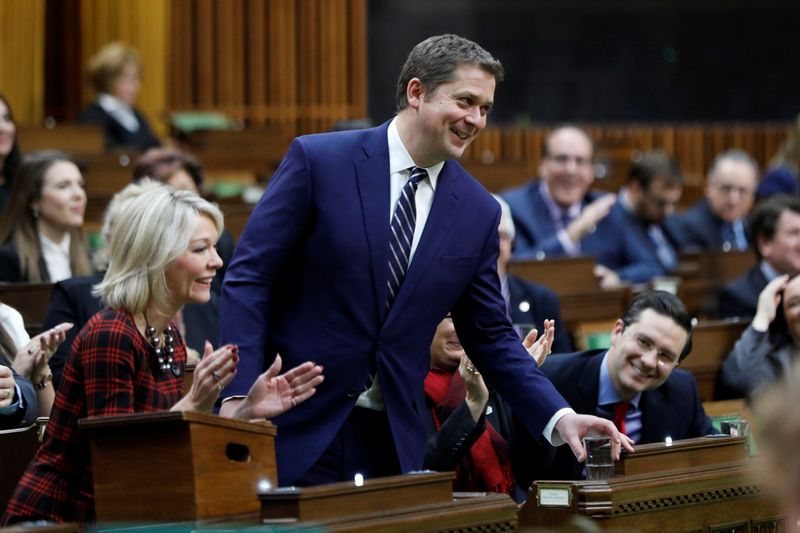By Steve Scherer
OTTAWA (Reuters) - The head of Canada's main opposition Conservatives quit on Thursday after losing an October election to Liberal Prime Minister Justin Trudeau, leaving the party in search of a more effective leader.
Andrew Scheer said his resignation was "the best thing for our Conservative Party," adding that he would stay on in his role until a replacement was chosen. Scheer, 40, is a fiscal and social conservative who was first elected at age 25.
Scheer was under pressure over his failure to beat Trudeau, who opinion polls showed was vulnerable after a series of scandals. When pictures of Trudeau in blackface emerged during the campaign, Scheer got a bump in the polls that faded before election day.
It is unclear when the party will elect another leader. The country's most prominent Conservative, Alberta government head Jason Kenney, has no intention of running, said a well-placed Conservative source.
Dustin van Vugt, the Conservatives' executive director, denied a report by Global News saying Scheer quit after it was discovered he had secretly used party money to pay for private schooling for his children.
Van Vugt said the party did indeed pay school costs, but he said all the proper procedures had been followed.
Former Conservative Cabinet minister Peter MacKay, lawmaker Erin O'Toole, now the party's critic for foreign affairs, and former interim Conservative leader Rona Ambrose are other potential leadership candidates.
Garry Keller, Ambrose's former chief of staff, said Scheer would have faced a battle to hold onto his job.
"He either had to decide to fight to the end through a leadership race, or he could leave on his own volition. If he had stayed on, it would have been a bloody fight," Keller told Reuters.
October's election was the second in a row that the Conservatives lost to Trudeau.
Although Scheer won more votes, his support was concentrated in Western provinces that have fewer parliamentary seats than Quebec and Ontario, where Trudeau prevailed.
Conservative critics complained Scheer's personal opposition to abortion and his reluctance to champion gay rights had hurt him among those who live in the eastern provinces of Canada.
"I felt it was time to put my family first," Scheer, a father of five, said when he announced his decision.
Trudeau, who has three children, thanked Scheer for his service and said he understood the difficulties of balancing the job with a family.
Trudeau lost his majority in the election and now must govern with the support of at least one opposition party. One senior Liberal source, who requested anonymity given the sensitivity of the situation, said chaos in the opposition was always good for the government.
But another well-placed Liberal said a leadership change could be problematic.

The resignation "relieves some of the short-term pressures, but the key question is, who replaces Scheer? If it's a superstar, then we have a problem", said the source.